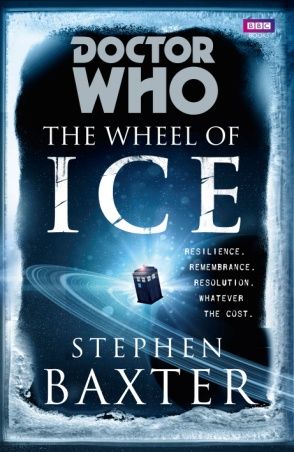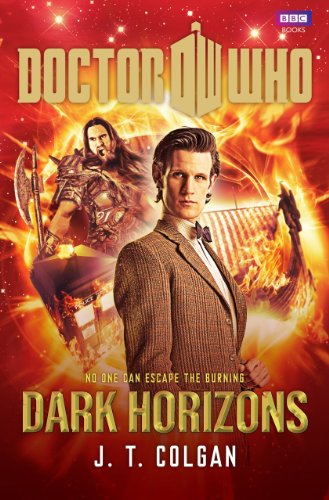Doctor Who: The Wheel of Ice
Friday, 17 August 2012 - Reviewed by Matt Hills
This review contains plot spoilers
As you might expect from SF luminary Stephen Baxter, one of the great strengths of this novel is its vivid creation of worlds and environments. The Wheel – a mining operation out at Saturn – and its frontier society are sharply delineated. Saturn’s rings also become a key part of the narrative, and Baxter has fun extrapolating from technologies such as “matter printing” and waste recyling. Overall, there’s a sense of vastness to this Doctor Who story, and not just because it deals with our solar system, but also thanks to the way it covers an epic sweep of time, going all the way back to the ‘Silurian’ era of Earth’s history. Appropriate Who technologies are also drawn upon, as Baxter deftly works in some crucial T-Mat action. The Doctor’s previous adventures are seen to have unintended consequences and unexpected outcomes over time, bringing them into the panoramic vista of Stephen Baxter’s work. Even UNIT get a few important mentions.
But perhaps this publication will always be remembered as a double event: firstly, it’s the return of ‘Past Doctor Adventures’ given that it features the second Doctor, Jamie and Zoe, and secondly it’s another novel that, like The Coming of the Terraphiles, brings a “name” SF author to the franchise. And whilst it certainly carries those historical lures for the reader, reducing The Wheel of Ice to milestones or markers does the book a bit of a disservice. Baxter’s affection for the show’s lead characters shines through, and he cleverly makes use of Zoe’s eidetic memory, for example, as well as finding a crafty way of making the artificial intelligence/service robot MMAC relevant to Jamie’s sense of identity. Furthermore, Zoe’s experiences from ‘The Wheel in Space’ and ‘The Mind Robber’ are variously tapped into, and Baxter exploits the gaps in her life experience when she’s confronted with a set of tasks that logic and scientific training can’t quite prepare her for. Both McCrimmon and Heriot are very well served throughout, without their subplots feeling too forced or too overly designed for them.
Baxter intersperses his linear adventure with “Interludes” which focus on different characters’ points of view and fill in moments of back story. For me, these were some of the most intriguing sequences of the novel, allowing Baxter to flashback through history (and weave in some great continuity references to Tom Baker and Peter Davison TV stories). One interlude offers a wonderful few pages tackling the emergence of consciousness itself: there’s no shortage of ambition to these set pieces, and their literary tangents greatly enrich the whole.
If Jamie and Zoe get plenty to do, then what of the second Doctor himself? On the whole, Troughton’s incarnation breezes playfully through situations, although sometimes he displays an angst which seems more in keeping with the parameters of ‘new Who’. He almost seems affronted to have encountered a mind bigger than his own, and the story’s eventual resolution calls for greater commitment than even a Time Lord can offer. Baxter preserves the Doctor’s essential mystery, but shows how his perspective on events differs crucially from all those around him, particularly when it comes to trying to communicate with alien artefacts or races.
In fact, communication emerges as a major theme. The Doctor is keen to speak to the strange blue beings who threaten the Wheel’s human colonists, and the entity known in Gallifreyan libraries as ‘Arkive’ is also seeking to communicate with others from its past. And even MMAC, the ‘cute robot’ character, unexpectedly discovers the value of communication. For all its ‘harder-than-usual’ SF stylings, epic scale, and scientific learning, The Wheel of Ice turns out to be about the emotional importance of being in touch. It may seem a rather cerebral read at times, but the head and the heart are both firmly and poetically in play here.
The book’s cover announces: “Resilience. Remembrance. Resolution. Whatever the cost.” Yet curiously the three words ritualistically recounted by the protagonist facing the Doctor are given as “Resilience. Remembrance. Restoration” as soon as one actually starts reading. In fact, these are the opening three words of the Prologue on page seven, and so can hardly be taken to constitute huge spoilers. Quite why “Restoration” has been substituted for “Resolution” remains unclear, especially as the latter doesn’t seem any more threatening or dramatic as a piece of book jacket self-promotion.
Given Baxter’s final flourish – a tribute to the always ongoing narratives of Doctor Who – I hope we hear more from him and this TARDIS crew. In short, this is a beautiful, artful novel that knowingly throws its characters into a range of scenarios which 1960s' television drama could never have brought to the screen. I found myself thinking more than a few times, “Jamie just did what?” Transcending TV budgets and special effects, The Wheel of Ice generates a true sense of wonder at the marvels of the universe, and the treasures of the Whoniverse.
As you might expect from SF luminary Stephen Baxter, one of the great strengths of this novel is its vivid creation of worlds and environments. The Wheel – a mining operation out at Saturn – and its frontier society are sharply delineated. Saturn’s rings also become a key part of the narrative, and Baxter has fun extrapolating from technologies such as “matter printing” and waste recyling. Overall, there’s a sense of vastness to this Doctor Who story, and not just because it deals with our solar system, but also thanks to the way it covers an epic sweep of time, going all the way back to the ‘Silurian’ era of Earth’s history. Appropriate Who technologies are also drawn upon, as Baxter deftly works in some crucial T-Mat action. The Doctor’s previous adventures are seen to have unintended consequences and unexpected outcomes over time, bringing them into the panoramic vista of Stephen Baxter’s work. Even UNIT get a few important mentions.
But perhaps this publication will always be remembered as a double event: firstly, it’s the return of ‘Past Doctor Adventures’ given that it features the second Doctor, Jamie and Zoe, and secondly it’s another novel that, like The Coming of the Terraphiles, brings a “name” SF author to the franchise. And whilst it certainly carries those historical lures for the reader, reducing The Wheel of Ice to milestones or markers does the book a bit of a disservice. Baxter’s affection for the show’s lead characters shines through, and he cleverly makes use of Zoe’s eidetic memory, for example, as well as finding a crafty way of making the artificial intelligence/service robot MMAC relevant to Jamie’s sense of identity. Furthermore, Zoe’s experiences from ‘The Wheel in Space’ and ‘The Mind Robber’ are variously tapped into, and Baxter exploits the gaps in her life experience when she’s confronted with a set of tasks that logic and scientific training can’t quite prepare her for. Both McCrimmon and Heriot are very well served throughout, without their subplots feeling too forced or too overly designed for them.
Baxter intersperses his linear adventure with “Interludes” which focus on different characters’ points of view and fill in moments of back story. For me, these were some of the most intriguing sequences of the novel, allowing Baxter to flashback through history (and weave in some great continuity references to Tom Baker and Peter Davison TV stories). One interlude offers a wonderful few pages tackling the emergence of consciousness itself: there’s no shortage of ambition to these set pieces, and their literary tangents greatly enrich the whole.
If Jamie and Zoe get plenty to do, then what of the second Doctor himself? On the whole, Troughton’s incarnation breezes playfully through situations, although sometimes he displays an angst which seems more in keeping with the parameters of ‘new Who’. He almost seems affronted to have encountered a mind bigger than his own, and the story’s eventual resolution calls for greater commitment than even a Time Lord can offer. Baxter preserves the Doctor’s essential mystery, but shows how his perspective on events differs crucially from all those around him, particularly when it comes to trying to communicate with alien artefacts or races.
In fact, communication emerges as a major theme. The Doctor is keen to speak to the strange blue beings who threaten the Wheel’s human colonists, and the entity known in Gallifreyan libraries as ‘Arkive’ is also seeking to communicate with others from its past. And even MMAC, the ‘cute robot’ character, unexpectedly discovers the value of communication. For all its ‘harder-than-usual’ SF stylings, epic scale, and scientific learning, The Wheel of Ice turns out to be about the emotional importance of being in touch. It may seem a rather cerebral read at times, but the head and the heart are both firmly and poetically in play here.
The book’s cover announces: “Resilience. Remembrance. Resolution. Whatever the cost.” Yet curiously the three words ritualistically recounted by the protagonist facing the Doctor are given as “Resilience. Remembrance. Restoration” as soon as one actually starts reading. In fact, these are the opening three words of the Prologue on page seven, and so can hardly be taken to constitute huge spoilers. Quite why “Restoration” has been substituted for “Resolution” remains unclear, especially as the latter doesn’t seem any more threatening or dramatic as a piece of book jacket self-promotion.
Given Baxter’s final flourish – a tribute to the always ongoing narratives of Doctor Who – I hope we hear more from him and this TARDIS crew. In short, this is a beautiful, artful novel that knowingly throws its characters into a range of scenarios which 1960s' television drama could never have brought to the screen. I found myself thinking more than a few times, “Jamie just did what?” Transcending TV budgets and special effects, The Wheel of Ice generates a true sense of wonder at the marvels of the universe, and the treasures of the Whoniverse.
 Written by Stephen Baxter
Written by Stephen Baxter Written by J. T. Colgan
Written by J. T. Colgan







